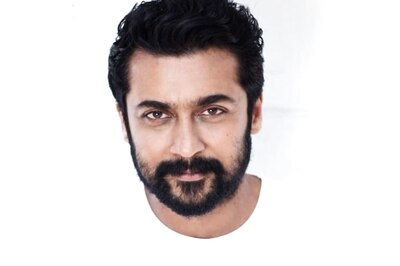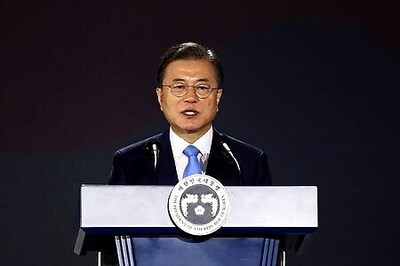
views
Moderna Inc said on Monday its experimental vaccine was 94.5% effective in preventing COVID-19 based on interim data from a late-stage clinical trial, becoming the second U.S. company in a week to report results that far exceed expectations.
Following are reactions to the news.
DR. ANTHONY FAUCI, THE TOP U.S. INFECTIOUS DISEASE EXPERT, SAID ON A CALL WITH REPORTERS:
“The vaccine is really the light at the end of the tunnel.”
Fauci urged Americans not to let their guard down because of this news, but to continue washing hands, avoiding crowds and being vigilant about social distancing.
ZOLTAN KIS, RESEARCH ASSOCIATE AT THE FUTURE VACCINE MANUFACTURING HUB, IMPERIAL COLLEGE LONDON
“If mRNA vaccines against COVID-19 gain regulatory approval, this will be a huge validation of the RNA vaccine production platform technology.
“Using this technology, vaccine candidates can be produced substantially faster in the future to combat virtually any infectious disease, by producing vaccines against both existing pathogens and future, currently unknown pathogens.
“Vaccine candidates can be produced against virtually any disease, because this is a platform technology, meaning that the production process, the purification processes and the formulation processes can remain the same no matter what vaccine or vaccine candidate is produced.
“This is a huge advantage in terms of the speed at which vaccine candidates can be developed and produced in the future.
“In the case of conventional vaccine production technologies, each vaccine required the development of a new production process, whereas in the case of the RNA vaccine production platform technology one process can produce vaccines and vaccine candidates against virtually any disease.”
PENNY WARD, VISITING PROFESSOR IN PHARMACEUTICAL MEDICINE AT KING’S COLLEGE LONDON AND CHAIR OF THE EDUCATION AND STANDARDS COMMITTEE OF THE FACULTY OF PHARMACEUTICAL MEDICINE
“Given the general similarity of the vaccine target and the immunological responses observed for all vaccines, these data generally suggest that vaccination will protect against severe illness and thereby should protect people from needing hospitalization or from dying from COVID.
“We still need to know if there is protection against infection, as the latter leads to herd protection while protection against illness has a value for an individual it will not prevent circulation of virus and risk of disease in unvaccinated persons, or in people not responding adequately to vaccination.”
RICHARD HATCHETT, CEO OF THE COALITION FOR EPIDEMIC PREPAREDNESS INNOVATIONS (CEPI)
(CEPI was set up in 2017 to fight emerging epidemics and is backed by 14 governments, the Bill and Melinda Gates Foundation and Britain’s Wellcome Trust)
“The Moderna results are as good as we could have hoped for and really terrifically encouraging.
“Moderna has also released information which suggests that the vaccine may protect against more severe disease (although they don’t address the statistical significance of this finding), and the reported side effects appear to be manageable.
“The fact that the vaccine shows stability when stored in a normal refrigerator for up to 30 days is also terrific news and will allow the vaccine to be distributed broadly.”
ANDREW HILL, SENIOR VISITING RESEARCH FELLOW IN THE DEPARTMENT OF PHARMACOLOGY AT THE UNIVERSITY OF LIVERPOOL
“This vaccine would be much easier to transport and administer than the one from Pfizer. Also the preliminary evidence suggests that it can prevent severe COVID-19 disease. However the Moderna vaccine is more expensive and there are fewer doses available in the next year.”
“No vaccine company has enough supplies available to protect everyone in need. We will need all the available vaccines with over 90% efficacy to cover global demand.”
ELEANOR RILEY, PROFESSOR OF IMMUNOLOGY AND INFECTIOUS DISEASE AT THE UNIVERSITY OF EDINBURGH
“Although the numbers are small, this trial also gives an indication that vaccination is effective in older and BAME individuals and prevents severe disease, all of which are key to allowing the world to start opening up again. The absolute prerequisite for a COVID-19 vaccine is that it stops people becoming ill enough to require hospital treatment and stops people dying. The preliminary data reported here suggest that this vaccine – and by extension, the Pfizer/BioNtech vaccine – will achieve this goal.
“The safety data also look promising. The side effects of vaccination appear to be in line with those typically seen for other adult vaccinations, including the seasonal influenza vaccination which is administered in many millions of doses every year.
“One important unknown is whether this vaccine, or any of the vaccines currently in trials, prevents disease transmission. It is likely that vaccines that prevent symptomatic disease will reduce the duration and level of infectiousness, and thus reduce transmission, but we don’t yet know if this effect will be large enough to make any meaningful difference to the spread of the virus within communities.
“But, overall, this is excellent news. Having more than one source of an effective vaccine will increase the global supply and, with luck, help us all to get back to something like normal sometime in 2021.”
PROF TRUDIE LANG, DIRECTOR, THE GLOBAL HEALTH NETWORK, NUFFIELD DEPARTMENT OF MEDICINE, UNIVERSITY OF OXFORD
“It is very good news indeed to see another vaccine coming through with similar efficacy results as were reported last week from Pfizer. This is also an interim analysis, which means that there were enough cases within the vaccinated volunteers to give statistical significance and allow the team to break the blind to determine who had the active vaccine and who had placebo.
“Here they found that of 95 cases of COVID, 90 had received the placebo and five the active vaccine. These early results suggest that there was a representation across different age groups and diverse communities in the protected group. This is really encouraging and it further demonstrates that a vaccine for COVID is a real probability and that having more than one supplier should help assure better and more equitable global availability.
“This vaccine is also an mRNA vaccine, so many of the same questions remain as we have been discussing with the Pfizer vaccine and these will be looked at carefully by the regulators.”
STEPHEN EVANS, PROFESSOR OF PHARMACOEPIDEMIOLOGY, LONDON SCHOOL OF HYGIENE & TROPICAL MEDICINE
“This announcement from Moderna is a further encouragement that vaccines will be found to not only have an acceptable efficacy, but an efficacy that is much greater than we had anticipated. This press release is more specific than that of others, in that it confirms the numbers in each group, which was able to be guessed at but to have it confirmed is helpful.
“The range of minor adverse effects reported are unsurprising and typical of almost any vaccine. These reactions tend to be local to where the injection was given and are rarely long-lasting or severe.
“Although they reported efficacy being over 94%, there is statistical uncertainty in this; but based on these data, the likely efficacy will be better than 85% which would be greater than most scientists would have expected.
“This is the first study to report on severe cases and, while uncertainty remains, the finding of no severe cases with the vaccine and 11 cases with placebo is very strong evidence that the vaccine prevents severe as well as mild disease. It is likely that convincing evidence in respect to deaths will probably only be obtained when the vaccine is in use.
“A wide range of people with illnesses and from minority groups were included in the trials as well as substantial numbers of older patients. We will need much more data and a full report or publication to see if the benefit is consistent across all groups, notably the elderly, but this is definitely encouraging progress.”
PETER OPENSHAW, PROFESSOR OF EXPERIMENTAL MEDICINE AT IMPERIAL COLLEGE LONDON
“This news from Moderna is tremendously exciting and considerably boosts optimism that we will have a choice of good vaccines in the next few months.”
“This latest press release is based on a study of 30,000 U.S. adults, including many high-risk or elderly persons. This gives us confidence that the results are relevant in the people who are most at risk of COVID-19 and in most need of the vaccines.”
“Moderna have also announced that the vaccine can be kept in a conventional freezer (-20 degrees Celsius) for up to 6 months, and that once thawed the vaccine can be kept for up to 30 days at standard refrigerator (2 to 8 degrees centigrade). This makes the vaccine much easier to deliver.
“In terms of side effects, news is also quite good. The first dose caused injection site pain in about 3% of people; the second dose was associated with transient generalized symptoms in about 10% of people with fatigue, muscle aches and flu like symptoms. This seems to indicate that they got the dose about right with acceptable adverse events. These effects are what we would expect with a vaccine that is working and inducing a good immune response.”
“We need more complete details than we have in this press release, but this announcement adds to the general feeling of optimism about vaccines for Covid-19. What we still don’t know is how long any protective immunity may last. For that, we will need to wait.”
Corporate reaction:
ALBERT BOURLA, CEO OF PFIZER, SAID ON TWITTER:
“I am thrilled to hear the good news coming out of @moderna_tx’s #COVID19 vaccine development programme. Our companies share a common goal – defeating this dreaded disease – and today we congratulate everyone at Moderna and share in the joy of their encouraging results.”
Political reaction:
ALEX AZAR, SECRETARY OF THE U.S. DEPARTMENT OF HEALTH & HUMAN SERVICES, SAID ON TWITTER:
“This news is another stunning result of President Trump’s leadership and his unwavering support for #OperationWarpSpeed, an incredible tribute to American scientists and innovators, and one more reminder that there is light at the end of the tunnel.”
Market reaction:
BRAD LONCAR, HEALTHCARE INVESTOR, CEO OF LONCAR INVESTMENTS, KANSAS CITY
“It’s really incredible to think back to January and February, messenger RNA was a totally unproven technology for anything, let alone vaccines. And you have to give a lot of credit to these companies. And you have to give a lot of credit to Dr. Fauci. It was a big bet – it was a risky thing to bet on.
“It’s hugely important that now two vaccines have succeeded, instead of just one. The entire country and the entire world is going to need to get vaccinated one day, and we need many vaccines. We need more than just these two to succeed, because we’re going to be capacity constrained.
“(Moderna and Pfizer) should be filing for approval within the next two to three weeks. And I think it’s fair to say that both of these will likely be approved in early to mid December. And I think that the first group – healthcare workers and people like that – will be vaccinated before the end of the year.
“To the extent that the Moderna one makes it easier logistically to deliver and specifically store, that’s a hugely important thing. Probably the people who will benefit most from it are people who traditionally don’t have the highest access to healthcare – people in rural areas or poorer countries.”
Disclaimer: This post has been auto-published from an agency feed without any modifications to the text and has not been reviewed by an editor
Read all the Latest News, Breaking News and Coronavirus News here




















Comments
0 comment